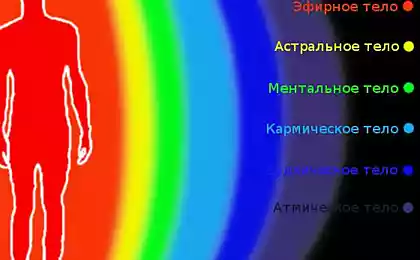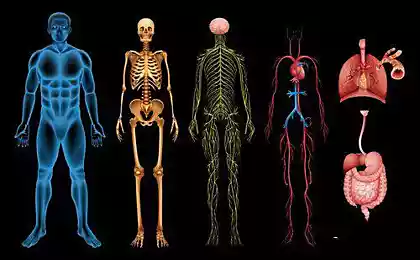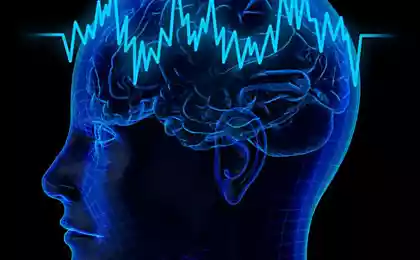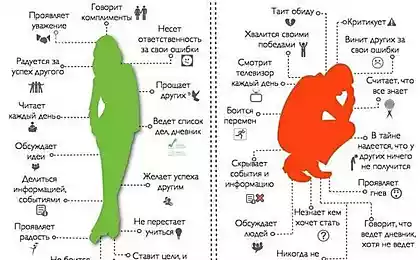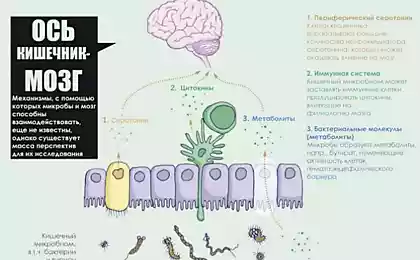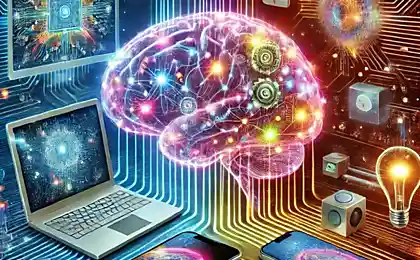891
The consequences can be very serious: how digital technologies affect our body and brain
In his book "Internet of things" journalist, author of seven books on business and technology Samuel Greengard analyzes how the network and various connected devices to re-construct our daily reality.
Publish an excerpt from the book, which was published by Massachusetts Institute of technology about the consequences of this universal connectedness: the growth of social inequality, memory impairment, loss of skills and the emergence of a new legal space.

The history of technology has always been filled with optimistic, if not utopian, expectations of a more happy, healthy and free from the future. However, with each new technological wave, there are numerous changes, some positive, others negative, and some completely unpredictable.
To predict how will work a specific technology on society and how it will interact with other technologies, social systems and factors, is almost impossible.
The Internet of things is no exception. There is no doubt that connected devices and systems will lead to increased automation, ease of use and, in some cases, to increase efficiency. EVE also promises a cheaper and improved products and services along with higher level of security and knowledge.
For example, when manufacturers embed sensors in everyday objects — packaging for food, clothes, household appliances or medical devices — is quite different and potentially much more perfect reality. Suddenly it becomes possible to quickly and efficiently locate defects and problems and to remove items from the trade.
When the system is in real time connected to the data flow and Analytics to determine consumer preferences, structure of purchases and other criteria, the manufacturer or the seller is unable to dynamically adapt to changes in the number of sales or consumption and adjust as the schedule of supply and production, and the pricing and other parameters for optimal performance.
In the end, the opportunity to delve into the data will override every industry — from transportation systems and law enforcement to agriculture and manufacturing.
The more businesses make us smart devices, the less we train as his body, and the brain
Consider: sensored sprinkler system simplifies watering and at the same time saves power and money of the homeowner. Connecting to the Internet, the system uses weather data to adjust the application rate based on whether the forecast rain in the near future. But if the same system will work all over the city, it will favorably impact on the quality of weather forecast, water management and savings in General.
If a network of homes and commercial organizations will work in one system, it will be much more effective than if each system is to optimize the conditions for individual homes independent of other systems. But what happens if someone wants to hack the system, leave it on and Deplete the reserves of water resources? What will happen if terrorists hacked the system of the Autonomous transport and stops the entire system of urban traffic? It is obvious that EVE can use both good and harm.

Criminals and terrorists can use cheap drones to spy and launch attacks. The ability to hack into a video camera or some other device like Google Glass, and watch what a person or an entire family, not only can expose private life, but also to open up access to confidential data in principle.
The document left on the kitchen table, is suddenly at risk. At the same time, what would happen if the government will block access to content using e-books? In the world of conventional paper books still exist. In the electronic world they disappear. This issue surfaced back in 2009, when Amazon temporarily restricted access to the George Orwell's novel "1984" — kind of ironic! — after discussing some issues with the publisher. Copies of the electronic version of the book suddenly disappeared from the Kindle users around the world.
The Internet of things will bring new difficulties and challenges concerning security, privacy and how we all will live in the new digital world. YVES, definitely, will be the subject of disputes and disagreements in society, and it also raises new questions about wealth and poverty. In addition, EVE will require the introduction of new laws — along with a significant, continuously occurring changes in public moral standards.
Smart system, stupid people?
One of the main issues of concern to scientists is whether people are stupid because of the use of smart devices? Do smart devices on our intelligence?
Modern smartphones store tens of thousands of contacts, the GPS will lead us to the destination, and we don't even have to follow the route; the bracelets on her wrists watching our calories and exercise that it was impossible to imagine even ten years ago. What is the downside?
As a result, people do not remember by heart even the most important phone numbers, maps no longer uses it and, despite unprecedented easy access to tools for fitness, obesity and other diseases related to a sedentary lifestyle and poor diet have become a chronic problem in modern society.
The paradox is that the more businesses make us smart devices, the less we are in contact with the natural environment, the less we are in harmony with our natural rhythm and the less we train as his body and brain.
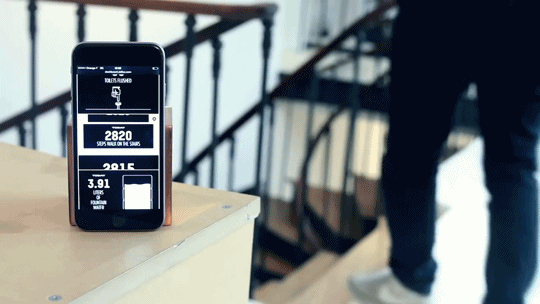
Psychologist and writer Douglas Lisle calls "the pleasure trap". The human brain, according to him, naturally selects the simplest and most enjoyable way to commit the act. But easiest does not always mean the best.
Nicholas Carr, author of "Soother. What the Internet is doing to our brains", raises the question of instant information culture of the Internet as something that certainly will be accelerated in its development with the advent of the Internet of things. "Now my mind perceives the information exactly as it presents us with the network: in the form of a fast-moving stream of individual particles.
Once I am absorbed into the depths of the words. I now easily glide over the surface like water skis," he wrote in 2008 in his article. Although researchers are just starting to learn cognitive thinking and how it shapes and reshapes-paced digital world, one thing is clear: our brain adapts and is more adaptable to new technologies. Whether we develop your intelligence, or our abilities fade into the background of artificial intelligence, we have yet to see.
The Internet of things and information inequalities
When in the 1990s the Internet began to take modern shape, one of the most serious problems was the problem of the digital divide between rich and poor. So-called digital divide is primarily in the potential economic and social inequality.
At the most basic level benefits of the technologies will be to those who will have access to data, information and knowledge. Those who have not will be digital tools, including Internet access, will lose opportunities for education, career development and other aspects of life. The Internet, obviously, only exacerbates these differences between people.
In the era of IV rates rise significantly. Although a network-connected refrigerators that automatically create shopping lists or sensored lighting system no one will change lives radically.
But in the end technology still throw those who are not connected to the network, over the side of the modern achievements. Someone deprive themselves of the most basic tools and features to simplify their own lives — or will have to work harder to get a decent salary. Simply draw an analogy between digital technology and the lack of it and the land on the farm with a hoe or combine.
The modern world forms the world involving immediate reward for their efforts
The consequences can be very serious. For example, in health care connected microscopic sensors inside the body and wearable devices on the wrist or clothes can give almost unimaginable information about the state of our health. Doctors can determine the condition of the patient, to monitor disease progression in real time and to assign the optimal dose of medication.
Such sensors may detect a heart attack or cancer at an early stage, to prevent stroke. It is obvious that those people who will not benefit from connected systems — and even entire countries, where such technologies are unavailable — do not get these benefits. They will be able to continue to rely on outdated and much less effective treatments.
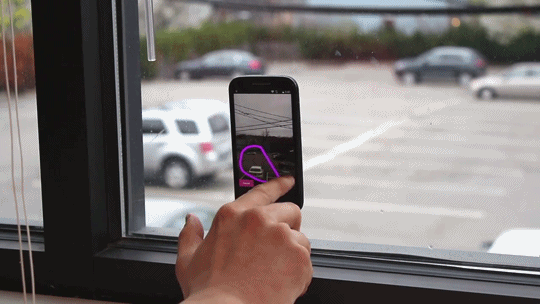
Similar problems arise in the field of education. Currently schools and teachers are just starting to experiment with the Internet of things. Connected devices and tagged systems provide a lot of new opportunities, including research with the help of RFID tag (eng. Radio-frequency identification, radio frequency identification. — Approx. ed.), augmented reality and other practical possibility of using sensors, tablets and other devices, ensuring more effective learning.
Will there be more rich in the digital attitude of people to prosper at the expense of those who are poorer? Whether knowledge in the digital world the key to the best jobs? Some (for example, Marcel Bulling, writer and futurist) argue that EVE can accelerate the trend of "loss of skills". According to forecasts of the writer, "children will learn less, but achieve more". In the future there will be no need to knowledge of facts from memory, because the facts will always be available in real time.
The threat of digital distraction
Smartphones have become the epicenter of communication. But now there is growing concern about the use of these devices in cars, restaurants and in many other situations and locations. Of course, they are changing the nature of social interaction, and many claim that for the worst.
Sherry Turkle, Professor of social studies of science and technology at MIT, author of "Alone together: why we expect more from technology than from each other", opines that there are serious reasons for concern. "New technologies shamelessly invade our lives, replacing a real relationship with people," she says. The consequences are not always advantageous for man.
According to research, the attention span of people is shrinking, modern world, consisting of hyperlinks forms the world involving immediate reward for their efforts. More than 64% of respondents say that modern technology is "more to distract students than help them academically".

The ability of critical thinking may also be reduced. Patricia Greenfield, distinguished Professor of psychology at UCLA and Director of the Centre for digital media for children, Los Angeles, found the following fact.
Among the students at the College who watched the brief news reports on CNN, those students who had seen only the lead (without a marquee), remembered more facts from the issue than those who watched the same news, but was distracted by the Ticker, the ads and weather information.
In General, studies Greenfield suggests that multi-tasking "prevents people from deeper to receive the information". Concern and the pedestrians and motorists. About a third of all collisions occur as a result of the carelessness of the driver, often due to talking on the phone or typing a text message.
In addition, about 8% pedestrians and cyclists were injured between 2008 and 2011 in new York city during the use of electronic devices such as mobile phone or player. The question is whether developers and engineers to create an integrated computer system for managing a potentially complex processes or the systems will distract us more and more?
Paradoxically, but the potential could be a solution (at least, before widespread fully automated vehicles) technology for the analysis of facial expression and the Internet of things. Car, the steering wheel or the cockpit can be equipped with special cameras and sensors that will monitor the condition of the driver or operator (if they are too sleepy or inattentive, etc.), analyzing the speed of blinking or head movements.
The development of a new legal space
Revolutionary changes happened in the legal systems around the world. More and more disputes involve questions about the rights, responsibilities and resources in areas such as intellectual property, copyright, trademarks, libel, crime and cyber espionage.
Jonathan BICK, an adjunct Professor of Internet law at the law faculty of Rutgers University, explains: "the Legal system is struggling to keep up with modern technology". The fundamental problem, he said, is that such thing as international law does not exist. "There are bilateral arrangements, conventions and agreements that attempt to restore order. But these laws apply only when enforced by force."

The most important obstacle, according to Pauline Reich, Director of the Institute for computer security in the Asia-Pacific region in Tokyo and co-author of the book "law, policy and technology: cyberterrorism, information warfare and Internet immobilization" is this: "what in one country is illegal, could be legal in another". In the end it all leads to the fact that in matters relating to jurisdiction and enforcement of obligations, it is very difficult to understand.
The number of such problems grows exponentially as data is moved to servers, cloud services and devices. It is almost impossible to understand where the data is stored and who can claim them. Many say that modern computer and communication technologies require the legal system much more than they ever expected.
The Internet of things will further complicate the already complicated world of technology. Attempt to understand where, how was the process of change or modification of the data on their electronic way, cause enormous difficulties. In fact, the more households and businesses are connected to the network, the more you get up a few basic questions: who is responsible for the problem, failure, interruption, especially if it leads to any damage, injury or death?
See also: How hackers protect their children from other hackers
Do I need to tape up the webcam on laptops
What happens if the country and its legislatures will cease to cooperate with the international community? What if purely personal information will be made public as a result of unsuccessful combination of several developments, none of which by itself was not the reason for this?
In addition, there are other issues of practical and legal nature which require consideration, in addition to the study of online contracts, user agreements and protection of confidentiality. The ultimate challenge will be the balance between risks and methods of protection and fundamental rights and freedoms of the individual.published
P. S. And remember, only by changing their consumption — together we change the world! ©
Source: theoryandpractice.ru/posts/13873-the-internet-of-things
Publish an excerpt from the book, which was published by Massachusetts Institute of technology about the consequences of this universal connectedness: the growth of social inequality, memory impairment, loss of skills and the emergence of a new legal space.

The history of technology has always been filled with optimistic, if not utopian, expectations of a more happy, healthy and free from the future. However, with each new technological wave, there are numerous changes, some positive, others negative, and some completely unpredictable.
To predict how will work a specific technology on society and how it will interact with other technologies, social systems and factors, is almost impossible.
The Internet of things is no exception. There is no doubt that connected devices and systems will lead to increased automation, ease of use and, in some cases, to increase efficiency. EVE also promises a cheaper and improved products and services along with higher level of security and knowledge.
For example, when manufacturers embed sensors in everyday objects — packaging for food, clothes, household appliances or medical devices — is quite different and potentially much more perfect reality. Suddenly it becomes possible to quickly and efficiently locate defects and problems and to remove items from the trade.
When the system is in real time connected to the data flow and Analytics to determine consumer preferences, structure of purchases and other criteria, the manufacturer or the seller is unable to dynamically adapt to changes in the number of sales or consumption and adjust as the schedule of supply and production, and the pricing and other parameters for optimal performance.
In the end, the opportunity to delve into the data will override every industry — from transportation systems and law enforcement to agriculture and manufacturing.
The more businesses make us smart devices, the less we train as his body, and the brain
Consider: sensored sprinkler system simplifies watering and at the same time saves power and money of the homeowner. Connecting to the Internet, the system uses weather data to adjust the application rate based on whether the forecast rain in the near future. But if the same system will work all over the city, it will favorably impact on the quality of weather forecast, water management and savings in General.
If a network of homes and commercial organizations will work in one system, it will be much more effective than if each system is to optimize the conditions for individual homes independent of other systems. But what happens if someone wants to hack the system, leave it on and Deplete the reserves of water resources? What will happen if terrorists hacked the system of the Autonomous transport and stops the entire system of urban traffic? It is obvious that EVE can use both good and harm.

Criminals and terrorists can use cheap drones to spy and launch attacks. The ability to hack into a video camera or some other device like Google Glass, and watch what a person or an entire family, not only can expose private life, but also to open up access to confidential data in principle.
The document left on the kitchen table, is suddenly at risk. At the same time, what would happen if the government will block access to content using e-books? In the world of conventional paper books still exist. In the electronic world they disappear. This issue surfaced back in 2009, when Amazon temporarily restricted access to the George Orwell's novel "1984" — kind of ironic! — after discussing some issues with the publisher. Copies of the electronic version of the book suddenly disappeared from the Kindle users around the world.
The Internet of things will bring new difficulties and challenges concerning security, privacy and how we all will live in the new digital world. YVES, definitely, will be the subject of disputes and disagreements in society, and it also raises new questions about wealth and poverty. In addition, EVE will require the introduction of new laws — along with a significant, continuously occurring changes in public moral standards.
Smart system, stupid people?
One of the main issues of concern to scientists is whether people are stupid because of the use of smart devices? Do smart devices on our intelligence?
Modern smartphones store tens of thousands of contacts, the GPS will lead us to the destination, and we don't even have to follow the route; the bracelets on her wrists watching our calories and exercise that it was impossible to imagine even ten years ago. What is the downside?
As a result, people do not remember by heart even the most important phone numbers, maps no longer uses it and, despite unprecedented easy access to tools for fitness, obesity and other diseases related to a sedentary lifestyle and poor diet have become a chronic problem in modern society.
The paradox is that the more businesses make us smart devices, the less we are in contact with the natural environment, the less we are in harmony with our natural rhythm and the less we train as his body and brain.

Psychologist and writer Douglas Lisle calls "the pleasure trap". The human brain, according to him, naturally selects the simplest and most enjoyable way to commit the act. But easiest does not always mean the best.
Nicholas Carr, author of "Soother. What the Internet is doing to our brains", raises the question of instant information culture of the Internet as something that certainly will be accelerated in its development with the advent of the Internet of things. "Now my mind perceives the information exactly as it presents us with the network: in the form of a fast-moving stream of individual particles.
Once I am absorbed into the depths of the words. I now easily glide over the surface like water skis," he wrote in 2008 in his article. Although researchers are just starting to learn cognitive thinking and how it shapes and reshapes-paced digital world, one thing is clear: our brain adapts and is more adaptable to new technologies. Whether we develop your intelligence, or our abilities fade into the background of artificial intelligence, we have yet to see.
The Internet of things and information inequalities
When in the 1990s the Internet began to take modern shape, one of the most serious problems was the problem of the digital divide between rich and poor. So-called digital divide is primarily in the potential economic and social inequality.
At the most basic level benefits of the technologies will be to those who will have access to data, information and knowledge. Those who have not will be digital tools, including Internet access, will lose opportunities for education, career development and other aspects of life. The Internet, obviously, only exacerbates these differences between people.
In the era of IV rates rise significantly. Although a network-connected refrigerators that automatically create shopping lists or sensored lighting system no one will change lives radically.
But in the end technology still throw those who are not connected to the network, over the side of the modern achievements. Someone deprive themselves of the most basic tools and features to simplify their own lives — or will have to work harder to get a decent salary. Simply draw an analogy between digital technology and the lack of it and the land on the farm with a hoe or combine.
The modern world forms the world involving immediate reward for their efforts
The consequences can be very serious. For example, in health care connected microscopic sensors inside the body and wearable devices on the wrist or clothes can give almost unimaginable information about the state of our health. Doctors can determine the condition of the patient, to monitor disease progression in real time and to assign the optimal dose of medication.
Such sensors may detect a heart attack or cancer at an early stage, to prevent stroke. It is obvious that those people who will not benefit from connected systems — and even entire countries, where such technologies are unavailable — do not get these benefits. They will be able to continue to rely on outdated and much less effective treatments.

Similar problems arise in the field of education. Currently schools and teachers are just starting to experiment with the Internet of things. Connected devices and tagged systems provide a lot of new opportunities, including research with the help of RFID tag (eng. Radio-frequency identification, radio frequency identification. — Approx. ed.), augmented reality and other practical possibility of using sensors, tablets and other devices, ensuring more effective learning.
Will there be more rich in the digital attitude of people to prosper at the expense of those who are poorer? Whether knowledge in the digital world the key to the best jobs? Some (for example, Marcel Bulling, writer and futurist) argue that EVE can accelerate the trend of "loss of skills". According to forecasts of the writer, "children will learn less, but achieve more". In the future there will be no need to knowledge of facts from memory, because the facts will always be available in real time.
The threat of digital distraction
Smartphones have become the epicenter of communication. But now there is growing concern about the use of these devices in cars, restaurants and in many other situations and locations. Of course, they are changing the nature of social interaction, and many claim that for the worst.
Sherry Turkle, Professor of social studies of science and technology at MIT, author of "Alone together: why we expect more from technology than from each other", opines that there are serious reasons for concern. "New technologies shamelessly invade our lives, replacing a real relationship with people," she says. The consequences are not always advantageous for man.
According to research, the attention span of people is shrinking, modern world, consisting of hyperlinks forms the world involving immediate reward for their efforts. More than 64% of respondents say that modern technology is "more to distract students than help them academically".

The ability of critical thinking may also be reduced. Patricia Greenfield, distinguished Professor of psychology at UCLA and Director of the Centre for digital media for children, Los Angeles, found the following fact.
Among the students at the College who watched the brief news reports on CNN, those students who had seen only the lead (without a marquee), remembered more facts from the issue than those who watched the same news, but was distracted by the Ticker, the ads and weather information.
In General, studies Greenfield suggests that multi-tasking "prevents people from deeper to receive the information". Concern and the pedestrians and motorists. About a third of all collisions occur as a result of the carelessness of the driver, often due to talking on the phone or typing a text message.
In addition, about 8% pedestrians and cyclists were injured between 2008 and 2011 in new York city during the use of electronic devices such as mobile phone or player. The question is whether developers and engineers to create an integrated computer system for managing a potentially complex processes or the systems will distract us more and more?
Paradoxically, but the potential could be a solution (at least, before widespread fully automated vehicles) technology for the analysis of facial expression and the Internet of things. Car, the steering wheel or the cockpit can be equipped with special cameras and sensors that will monitor the condition of the driver or operator (if they are too sleepy or inattentive, etc.), analyzing the speed of blinking or head movements.
The development of a new legal space
Revolutionary changes happened in the legal systems around the world. More and more disputes involve questions about the rights, responsibilities and resources in areas such as intellectual property, copyright, trademarks, libel, crime and cyber espionage.
Jonathan BICK, an adjunct Professor of Internet law at the law faculty of Rutgers University, explains: "the Legal system is struggling to keep up with modern technology". The fundamental problem, he said, is that such thing as international law does not exist. "There are bilateral arrangements, conventions and agreements that attempt to restore order. But these laws apply only when enforced by force."

The most important obstacle, according to Pauline Reich, Director of the Institute for computer security in the Asia-Pacific region in Tokyo and co-author of the book "law, policy and technology: cyberterrorism, information warfare and Internet immobilization" is this: "what in one country is illegal, could be legal in another". In the end it all leads to the fact that in matters relating to jurisdiction and enforcement of obligations, it is very difficult to understand.
The number of such problems grows exponentially as data is moved to servers, cloud services and devices. It is almost impossible to understand where the data is stored and who can claim them. Many say that modern computer and communication technologies require the legal system much more than they ever expected.
The Internet of things will further complicate the already complicated world of technology. Attempt to understand where, how was the process of change or modification of the data on their electronic way, cause enormous difficulties. In fact, the more households and businesses are connected to the network, the more you get up a few basic questions: who is responsible for the problem, failure, interruption, especially if it leads to any damage, injury or death?
See also: How hackers protect their children from other hackers
Do I need to tape up the webcam on laptops
What happens if the country and its legislatures will cease to cooperate with the international community? What if purely personal information will be made public as a result of unsuccessful combination of several developments, none of which by itself was not the reason for this?
In addition, there are other issues of practical and legal nature which require consideration, in addition to the study of online contracts, user agreements and protection of confidentiality. The ultimate challenge will be the balance between risks and methods of protection and fundamental rights and freedoms of the individual.published
P. S. And remember, only by changing their consumption — together we change the world! ©
Source: theoryandpractice.ru/posts/13873-the-internet-of-things
James Altucher: How to become a master in any case
How to avoid children's manipulations: specific problems and possible solutions

